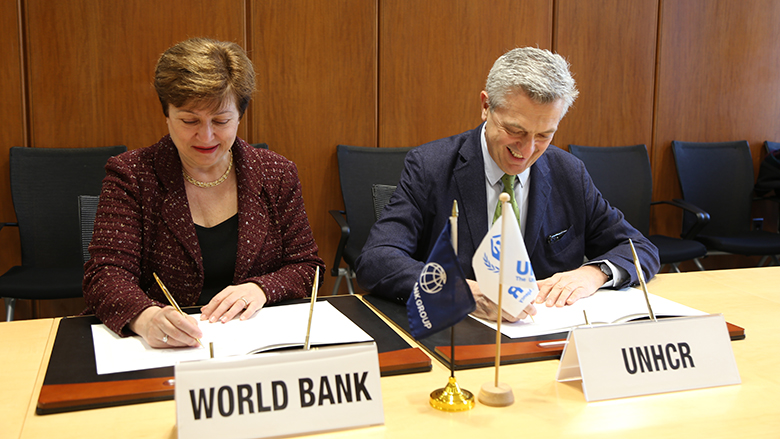World Bank Group Chief Executive Officer Kristalina Georgieva and UN High Commissioner for Refugees Filippo Grandi signed a Memorandum of Understanding today to establish a new Joint Data Center on forced displacement. Set to begin operating later this year, the new Center responds to growing demand for more and better data, to inform a stronger global response to forced displacement and improve policies and programming to help affected people.
Facing historically high levels of forced displacement, currently with about 66 million refugees, internally displaced persons and asylum seekers globally, the Bank Group and UNHCR have been expanding collaboration in recent years, including through a series of joint analytical work in the Horn of Africa, the Lake Chad Basin and the Middle East.
The new Center builds on these efforts, and focuses on the collection, analysis and dissemination of primary microdata. This will enable the two institutions to complement each other’s strengths; UNHCR in protection data, registration and collection, and the Bank Group in household data, policy dialogue and analytical work. The Center will serve as a catalyst to stimulate work across both institutions, as well as to support governments, multi-lateral development banks, private sector, civil society, researchers, and others. Partnerships will be explored with other organizations that have substantive experience in forced displacement data, to further enhance complementarities and synergies.
In terms of scope, the Center will cover demographic and socioeconomic data – detailed information on income, consumption, skills, health, and economic activity among others – that will be anonymized to protect privacy and prevent identifying individuals. Data will encompass refugees, internally displaced persons, stateless people, returnees, asylum-seekers, and host populations.
A joint team has been developing specific initiatives since the Center was first announced in October 2017, which may include establishing a data library, developing methodological tools in line with the work of the UN Statistical Commission, conducting poverty assessments of refugees and host communities, implementing capacity building programs for data collection in host countries, and exploring the potential of new technologies to enhance available data.
While there have been tremendous efforts to collect data and build evidence on forced displacement so far, challenges remain regarding methodology, access, capacity, and use of country systems.
In the global compact on refugees, currently under development led by UNHCR, a more comprehensive response to forced displacement is envisioned which relies on high-quality data to to inform efficient and effective policies and programs , particularly in a resource-constrained environment. To support these objectives, the Center will:
- Ensure population and socioeconomic data are systematically collected and analyzed
- Facilitate open access to forced displacement data, while ensuring the integrity of the legal protection framework
- Promote innovations to enhance forced displacement data through satellite imagery, cell phones, and other new technologies
- Strengthen the global data collection system, establishing common norms, definitions, and methodologies, and support efforts to fortify country systems where necessary.
The location and staffing arrangements for the new Center are currently under discussion.

